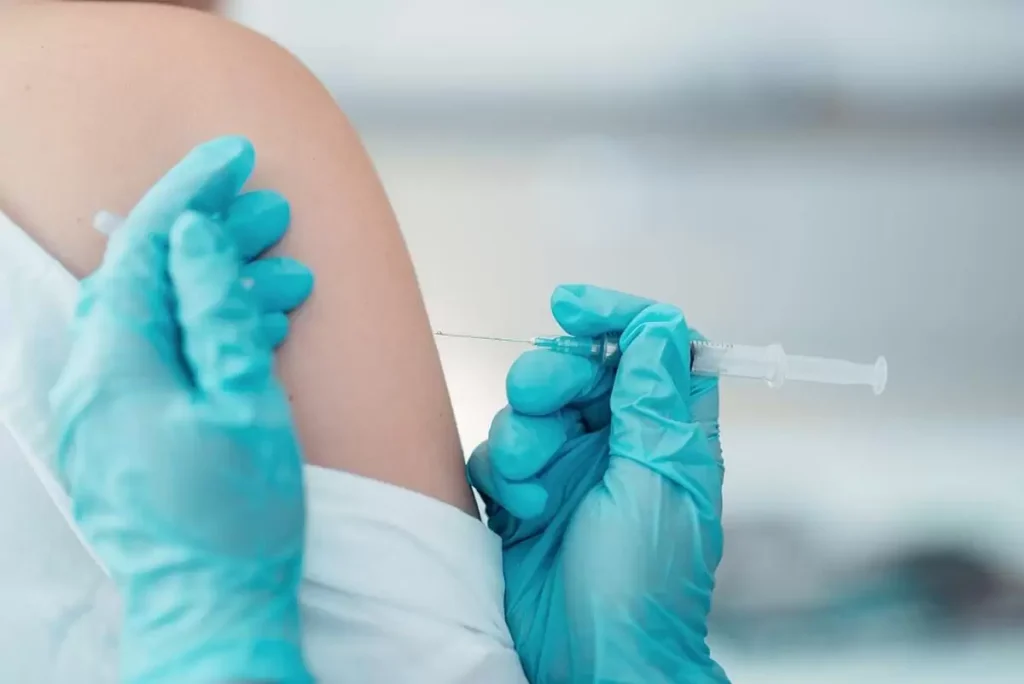The injectable contraceptive, commonly known as Depo or simply injectables, offers an effective and low-maintenance way to prevent pregnancy. Administered by a healthcare professional every three months, it delivers long-lasting protection without requiring daily attention. This guide explains how it works, what to expect, and how to make the most of this method safely and effectively.
What It Is
The contraceptive injectable is a hormonal method of birth control that contains progestin. Administered by a healthcare professional, one shot protects against pregnancy for 13 weeks. Once administered, there’s no daily action required, making it ideal for individuals seeking a low-maintenance contraceptive method.
How It Works?
For three months, the injectable continuously releases progestin hormones, which thickens cervical mucus that prevents the sperm cell from meeting the egg cell to fertilize. The injectable also makes it difficult for the egg cell to attach to the uterine wall if it gets fertilized, another action preventing pregnancy.
How To Use It?
The only responsibility the injectable will require you is the regular appointments with your healthcare provider for the shot. You’ll have to visit the clinic every three months to get a shot of your injectable, and you’ll come back again when you’re due for the next one. Easy!
It’s important to tell your healthcare provider when you had your last period because that will determine how soon you’ll be protected after getting the injectable. You’ll be protected immediately if you have your period at the time of the shot, but if you’re not on your period, you’ll have to wait for one week for it to be able to protect you.
Getting your injectable on time is very crucial. If you’re late for the next shot for more than four weeks, and have been having sex without any other form of protection, you may need to get a pregnancy test before getting the next shot.
Benefits
- Easy to use and requires minimal effort.
- Discreet—no one can tell you’re on it unless you choose to share.
- Doesn’t interrupt sexual activity.
- Eliminates the need to remember daily pills.
- May result in lighter or absent periods.
- Provides reliable protection for three months at a time.
- Suitable for women who cannot take estrogen.
- Safe for breastfeeding mothers.
- Highly effective when administered on schedule.
Potential Side Effects
It’s normal to be worried about the changes that you might experience when you take it the first time, but most women do not have a problem with the injectables. In case you do experience anything, that may be a sign that your body is adjusting to the hormones you’re introducing to it. These will go away in time once your body has adjusted.
Common Experiences (first 6–12 months):
- Irregular bleeding, including longer, heavier periods, spotting, or absence of periods.
- Changes in appetite.
- Requirement to visit the clinic every three months.
- Temporary delay in fertility after stopping injections.
Less Common Experiences:
- Changes in sex drive
- Depression or mood changes
- Hair loss or increased facial/body hair
- Headaches
- Nausea
- Sore breasts
If side effects persist after two courses, consider discussing alternative contraceptive options with your healthcare provider.
Common Misunderstandings:
- Not having periods is not harmful and does not mean that the blood is “building up” inside the woman.
- Does not cause infertility.
- Even though it is possible for the return of fertility to be delayed, getting the shot on time every three months (13 weeks) is still crucial if you want to effectively prevent pregnancy.
- Getting the shot does not disrupt or affect an existing pregnancy.
Source:
ScienceDirect. (n.d.). Injectable contraception. Retrieved December 5, 2024, from
https://www.sciencedirect.com/topics/medicine-and-dentistry/injectable-contraception
Marie Stopes Timor-Leste. (n.d.). Injectable contraception. Retrieved December 5, 2024, from
https://www.mariestopes.tl/services/womens-health/injectable/








